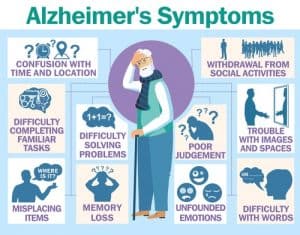If you see someone wearing purple this month, they might be showing their support for efforts to end Alzheimer’s disease. June is Alzheimer’s and Brain Awareness Month, and the Alzheimer’s Association is asking people to wear purple to help raise awareness about the disease, which will become more prevalent as the baby boomer generation ages.
According to the Alzheimer’s Association, around 5.7 million Americans had dementia as a part of Alzheimer’s disease last year. Of those, 5.5 million were age 65 and older. The association predicts that by mid-century, more than 28 million baby boomers will develop Alzheimer’s.
10 Warning Signs and Symptoms of Alzheimer’s
How can you tell if a loved one might have Alzheimer’s or is just experiencing normal age-related changes in memory? The Alzheimer’s Association shares these 10 warning signs and symptoms:
1. Memory loss that disrupts daily life.
A common sign of early Alzheimer’s disease is forgetting recently learned information or important dates, or asking for the same information over and over. What’s a typical age-related change? Sometimes forgetting names or appointments, but remembering them later.
2. Challenges in planning or solving problems:
This could include trouble following a familiar recipe or keeping track of monthly bills. What’s a typical age-related change? Making occasional errors when balancing a checkbook.
3. Difficulty completing familiar tasks:
This could include having trouble driving to a familiar location or remembering the rules of a favorite game. What’s a typical age-related change? Occasionally needing help to use the settings on a microwave or to record a television show.
4. Confusion with time or place:
This could include losing track of dates or forgetting where they are or how they got there. What’s a typical age-related change? Getting confused about the day of the week but figuring it out later.
5. Trouble understanding visual images and spatial relationships:
Vision problems could cause difficulty reading, judging distance and problems with driving. What’s a typical age-related change? Vision changes related to cataracts.
6. New problems with words:
This could include having trouble following or joining a conversation, repeating themselves, or calling things by the wrong name. What’s a typical age-related change? Sometimes having trouble finding the right word.
7. Misplacing things:
This could include putting things in unusual places or losing things. Sometimes, they may accuse others of stealing. What’s a typical age-related change? Misplacing things from time to time and retracing steps to find them.
8. Decreased or poor judgment:
This could include using poor judgment when dealing with money or paying pay less attention to grooming. What’s a typical age-related change? Making a bad decision once in a while.
9. Withdrawal from work or social activities:
This could include remove themselves from hobbies, social activities, work projects or sports. What’s a typical age-related change? Sometimes feeling weary of obligations.
10. Changes in mood and personality:
This could include becoming confused, suspicious, depressed, fearful, anxious, or easily upset. What’s a typical age-related change? Becoming irritable when a routine is disrupted.
We’re An Elder Care Law Firm Who Can Help
As elder care attorneys and care coordinators, we can help families facing the difficult prospect of dealing with a loved one stricken with Alzheimer’s establish a Continuum of Care Plan.
Someone with Alzheimer’s disease may start out with cognitive impairment and forgetfulness but eventually require full-time care because they no longer can feed themselves.
Getting the necessary help as early on in the process as possible allows the firm to leverage the time when the person has relatively good health to protect assets and access home care benefits.
Ideally, as soon as the client is diagnosed with a condition, they should come to the Kabb Law Firm to start a plan to advocate all the care, legal and financial needs that a life care plan is designed to address.
If you or a loved one was diagnosed with Alzheimer’s or dementia, contact us to schedule an appointment with our expert elder law & care team today.
For more information on Alzheimer’s disease and to learn how to join the #EndAlz campaign, visit www.alz.org.

